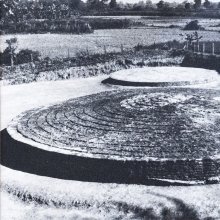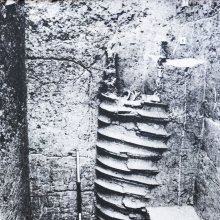Kapilavastu, Kapila-vastu: 14 definitions
Introduction:
Kapilavastu means something in Buddhism, Pali, Hinduism, Sanskrit, the history of ancient India, Tamil. If you want to know the exact meaning, history, etymology or English translation of this term then check out the descriptions on this page. Add your comment or reference to a book if you want to contribute to this summary article.
Images (photo gallery)
In Hinduism
General definition (in Hinduism)
Source: eScholarship: Kosalan PhilosophyKapilavastu (कपिलवस्तु).— The sub-Himālayan Śākyan-gaṇa, which tradition claims descended from either Ikṣvāku or one of his progeny, had an autonomous administration. Inhabiting forest tracts, they named their capital, Kapilavastu, after the famous brāhmaṇa sage, Kapila. Lamotte described the Śākyas as “a clan of uncertain origin but which had to a certain degree been subjected to brāhmaṇical influence”.
In Buddhism
Mahayana (major branch of Buddhism)
Source: Wisdom Library: Maha Prajnaparamita SastraKapilavastu (कपिलवस्तु), in Nepal, principal city of the Śākya clan. Its location has been discovered near the village of Paderia, two miles north of Bhavanpur. Cf. P. C. Mukherji, Antiquities in the Tarai, Nepal: the region of Kapilavastu, AR Arch Surv., 1901; V. A. Smith, Kapilavastu, in ERE, VII, p. 659. – The Buddha was born in the Lumbinī park (Rumindeī) east of the city; he stayed there until his departure for enlightenment. He returned during the first year of his ministry and made a large number of conversions. He returned again to pacify the conflict between Śakya and Koliya concerning the Rohinī river (Dhammapadaṭṭha, III, p. 254), and during the punitive expedition of Viḍūḍabha (Jātaka, IV, p. 144 sq.).
Source: archive.org: Bulletin of the French School of the Far East (volume 5)Kapilavastu (कपिलवस्तु) (in Chinese: kia-p'i-lo-p'o) refers to one of the fifty-five kingdoms enumerated in chapter 17 of the Candragarbha: the 55th section of the Mahāsaṃnipāta-sūtra, a large compilation of Sūtras (texts) in Mahāyāna Buddhism partly available in Sanskrit, Tibetan and Chinese.—In the Candragarbhasūtra, the Bhagavat invites all classes of Gods and Deities to protect the Law [dharma?] and the faithful in their respective districts.—In Kapilavastu, the following deities are appointed (among others): The Kinnara Agnipāla; the Gandharva Kuṭila-son (Kuṭilasvara?); the Yakṣa Prajāpati; the Asura Che-mo-na-tche; the Nāgarāja Po-na-meou-tche; the Kumbhāṇḍa Mahā-po-che (Mahāpraja?) the two Goddesses Caṇḍī and Caṇḍā.
Kapilavastu (कपिलवस्तु) [or Kapilava] (in Chinese: Kia-p'i-lo-p'o) is the name of an ancient kingdom associated with Kṛttikā or Kṛttikānakṣatra, as mentioned in chapter 18.

Mahayana (महायान, mahāyāna) is a major branch of Buddhism focusing on the path of a Bodhisattva (spiritual aspirants/ enlightened beings). Extant literature is vast and primarely composed in the Sanskrit language. There are many sūtras of which some of the earliest are the various Prajñāpāramitā sūtras.
General definition (in Buddhism)
Source: eBooks@Adelaide: A Record of Buddhistic KingdomsKapilavastu, “the city of beautiful virtue,” was the birthplace of Sakyamuni, but was destroyed, during his lifetime.
It was situated a short distance north-west of the present Goruckpoor, lat. 26d 46s N., lon. 83d 19s.
E. Davids says: “It was on the banks of the river Rohini, the modern Kohana, about 100 miles north-west of the city of Benares.”
India history and geography
Source: archive.org: Ceylon Branch of the Royal Asiatic Society 1963Kapilavastu or Kapilavastuvihāra is the name of an ancient building that once existed near Polonnaruva (Polonnaruwa), Ceylon (Sri Lanka).—Parakkamabāhu I also built:—(i) Kapila or Kapilavastu-vihāra; (ii) Dakṣiṇārāma; (iii) Pacchimārāma; (iv) the Suluvādenige of gold; (v) Purvārāma; (vi) Atubadalena-vihāra; (vii) Isipatana-vihāra in the Rājavesibhujaṅga suburb; (viii) Kusinārā-vihāra in the Sīhapura suburb; (ix) Veluvana-vihāra in the Vijita suburb; and (x) between the Palace and the 3 suburbs, at each gāvuta (about 2miles), a vihāra with Sermon and Image Houses.
Source: eScholarship: Kosalan Philosophy (history)Kapilavastu (कपिलवस्तु).—The Buddha himself says that he hails from a principality situated among the Kosalans. He grew up in Kapilavastu at the time when Kosala, Magadha, and the Vajji confederation were at their zenith. Gotama Buddha often visited Kapilavastu (his native Śākya town) and Vaiśālī, but spent a great deal of time in Śrāvastī, the capital of Kosala.
Source: Ancient Buddhist Texts: Geography of Early BuddhismKapilavastu (कपिलवस्तु) is another name for Kapilavatthu: an ancient locality situated in Majjhimadesa (Middle Country) of ancient India, as recorded in the Pāli Buddhist texts (detailing the geography of ancient India as it was known in to Early Buddhism).—Kapilavatthu the capital of the Śākya country, named after the Ṛṣi Kapila. The Lalitavistara calls [Kapilavatthu as] Kapilavastu and sometimes Kapilapura or Kapilāhvayapura. These names occur also in the Mahāvastu. The Divyāvadāna also connects Kapilavastu with the sage Kapila. The Buddhacarita also mentions [Kapilavatthu] as Kaplasya vastu. The Mahāvastu says that Kapilavastu was surrounded by seven walls.
Yuan Chwang visited Kapilavastu, the towns of Krakucandra and Konāgamana and Lumbini or La-fa-ni grove, the birth place of Lord Buddha. The village of Piprāwā (Birdpur Estate, Basti District) – the findspot of the famous Piprāwā Vase – marks, according to Dr. Fleet, the site of Kapilavastu. Dr. Rhys Davids, however, takes Tilaura Kot to be the old Kapilavastu and Piprāwā to be the new city built after the destruction of the old city by Viḍūḍabha.

The history of India traces the identification of countries, villages, towns and other regions of India, as well as mythology, zoology, royal dynasties, rulers, tribes, local festivities and traditions and regional languages. Ancient India enjoyed religious freedom and encourages the path of Dharma, a concept common to Buddhism, Hinduism, and Jainism.
Languages of India and abroad
Sanskrit dictionary
Source: DDSA: The practical Sanskrit-English dictionaryKapilavastu (कपिलवस्तु).—Name of the town in which Buddha was born. (kapilā) षष्ठी (ṣaṣṭhī) The sixth day in the dark half of भाद्रपद (bhādrapada).
Kapilavastu is a Sanskrit compound consisting of the terms kapila and vastu (वस्तु).
Source: Cologne Digital Sanskrit Dictionaries: Edgerton Buddhist Hybrid Sanskrit DictionaryKapilavastu (कपिलवस्तु).—(or °vāstu), nt. (= Pali Kapilavatthu); see also prec., and Kapilasāhvaya, Kapilāhvaya; name of the city in which Śākyamuni Buddha was born: its founda- tion, with explanation of the name (the Śākya princes founded it on the site of the hermitage of the ṛṣi Kapila [Page168-a+ 71] with his permission), Mahāvastu i.351.19 ff.; spelling °vāstu (rare and dubious) Mahāvyutpatti 4118 (but Mironov °vastu); Divyāvadāna 67.3 (text, but not repeated thus in Index; °vastu 90.30; 390.26); best ms. of Avadāna-śataka °vāstu ii.98.5 ff., several times, and 111.7 (here acc. sg. in ms. °vāstum, Speyer em. °vastu; followed by vowel, m hiatus-bridger? prose), but usually °vastu in Avadāna-śataka, as i.345.6, 12, etc.; °vastu otherwise, Saddharmapuṇḍarīka 311.2; Lalitavistara 26.13 etc., very common here and in Mahāvastu (see Indexes), also in Gaṇḍavyūha, e.g. 222.26 ff., and elsewhere.
Source: Cologne Digital Sanskrit Dictionaries: Cappeller Sanskrit-English DictionaryKapilavastu (कपिलवस्तु).—[substantive] [Name] of Buddha's native town.
Source: Cologne Digital Sanskrit Dictionaries: Monier-Williams Sanskrit-English DictionaryKapilavastu (कपिलवस्तु):—[=kapila-vastu] [from kapila > kapi] n. Name of the town in which Śākyamuni or Buddha was born.
[Sanskrit to German]
Sanskrit, also spelled संस्कृतम् (saṃskṛtam), is an ancient language of India commonly seen as the grandmother of the Indo-European language family (even English!). Closely allied with Prakrit and Pali, Sanskrit is more exhaustive in both grammar and terms and has the most extensive collection of literature in the world, greatly surpassing its sister-languages Greek and Latin.
Tamil dictionary
Source: DDSA: University of Madras: Tamil LexiconKapilavastu (கபிலவஸ்து) noun < Kapilavastu. Kapilavastu, Buddha's birth-place; புத்தர் அவதரித்த நகரம். (மணிமேகலை அரும்.) [puthar avatharitha nagaram. (manimegalai arum.)]
Tamil is an ancient language of India from the Dravidian family spoken by roughly 250 million people mainly in southern India and Sri Lanka.
See also (Relevant definitions)
Partial matches: Kapila, Vastu.
Starts with: Kapilavastuvihara.
Full-text (+59): Kapilahvaya, Kapilapura, Suddhodana, Nyagrodhika, Kapilavastava, Vimalavyuha, Dharmadhatupratibhasaprabha, Nanaratnavyuha, Shilpabhijna, Kapilasahvaya, Suvarnabha, Kapilavastavya, Kapilahvayapura, Kapilasyavastu, Sugandhi, Nyagrodharama, Siddhartha, Kapila, Kapilavastuvihara, Gautama.
Relevant text
Search found 31 books and stories containing Kapilavastu, Kapila-vastu, Kapilavasthu, Kapilavasdu, Kapilavasdhu; (plurals include: Kapilavastus, vastus, Kapilavasthus, Kapilavasdus, Kapilavasdhus). You can also click to the full overview containing English textual excerpts. Below are direct links for the most relevant articles:
Maha Prajnaparamita Sastra (by Gelongma Karma Migme Chödrön)
Appendix 3 - Return of the Buddha to Kapilavastu < [Chapter V - Rājagṛha]
Part 4 - The buddha’s frequent sojourns in Rājagṛha and Śrāvastī < [Chapter V - Rājagṛha]
Appendix 2 - The deity of the Bodhi tree (bodhivṛkṣadevatā) < [Chapter VI - The Great Bhikṣu Saṃgha]
The Mahavastu (great story) (by J. J. Jones)
Chapter VIII - The Wooing of Yaśodharā < [Volume II]
Chapter X - The Buddha’s Visit to Kapilavastu < [Volume III]
Chapter XVI - The great renunciation again < [Volume II]
A Record of Buddhistic Kingdoms (by Fa-Hien)
The Fo-Sho-Hing-Tsan-King (A Life of Buddha) (by Samuel Beal)
Lives of Buddha (5): Cung-pen-k’i-king < [Introduction]
Lives of Buddha (2): Siu-hing-pen-k’i-king < [Introduction]
Varga 10. Bimbasāra Rāja Invites The Prince < [Kiouen III]
The travels of Fa-Hian (400 A.D.) (by Samuel Beal)
Triple Stream < [July – September, 1994]
The Origin Of Buddhist Art In India < [March-April, 1930]
Buddha and Asoka < [July – September, 1994]


